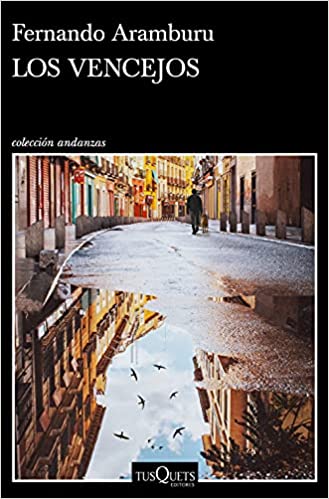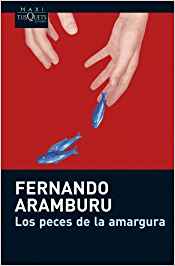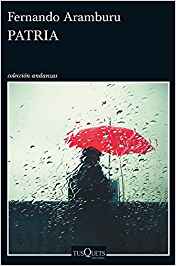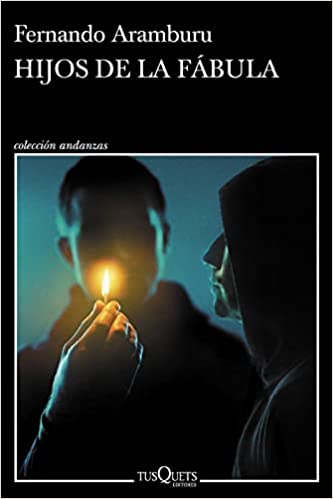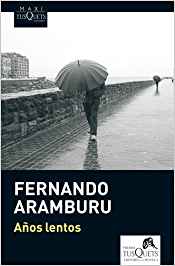The story. A term more than hackneyed at the moment to replace other more precise but also more demodé uses such as: argumentation, justification or ideology. The point is that all this, let us say that the background of things, runs the risk of ending up in the bag of empty words, a bag increasingly full of transpositions, euphemisms and other interested uses of language towards Newspeak.
That is why it is always interesting to find a writer of "short story»Extensive and true, a composer of microcosm of characters to reflect the world in its just diversity. A diversity like a river that is not partisan or intentional, but simply that gives way to events as an inexhaustible flow from which everyone can take their drink. What of Fernando Aramburu is to give voice to characters who wander between reality and fiction, locating us in current or historical events; in intrahistories or chronicles that complement each other towards the most unsuspected realities.
"Patria" is a good example of that story composition without hot cloths. Experiences transferred to fiction, characters and circumstances recognizable by all in the midst of a conflict that still smokes from its embers. But Aramburu's story is much richer. From his pen, poems, essays, articles, stories and novels were born and are born, an extensive literary estate cultivated seasonally towards profuse harvests. Focusing on his prose, which is what usually occupies me in any author, I will now indicate my tastes ...
3 recommended novels by Fernando Aramburu
Swifts
Swifts fly nonstop for months. They do not stop at all because they are able to meet all your vital demands in constant flight. Which confirms in some way what the wonderful sensation of fullness of flight can suppose for a living being.
Aramburu Perhaps he takes the swifts as a metaphor for restless life, of love without a country, of the notion of existence from a privileged position at that point where everything can be seen in a different way, without anything hindering the complete visualization of what is that we carry and what we have left.
In a novel as interesting as it is timely, Aramburu lets go of his best-seller Patria and just leaves the rope a little unrefolding so that those who approached his literature from its sociological aspect will still find a haven in that image of Spain in the boiling state. Although this time the story goes more from the inside out, from the complete mimicry with the protagonist to that magical ability to show reality from the vision of another.
Toni, a high school teacher angry at the world, decides to end his life. Meticulous and serene, he has chosen the date: within a year. Until then every night he will write, on the floor he shares with his bitch Pepa and a library from which it is shed, a personal chronicle, hard and disbelieving, but no less tender and humorous.
With it he hopes to discover the reasons for his radical decision, to reveal every last particle of his privacy, to tell his past and the many daily affairs of a politically troubled Spain. They will appear, dissected with an implacable scalpel, his parents, a brother he cannot bear, his ex-wife Amalia, from whom he cannot disconnect, and his troublesome son Nikita; but also his caustic friend Patachula. And an unexpected Águeda. And in the succession of love and family episodes of this addictive human constellation, Toni, a disoriented man determined to recount its ruins, paradoxically breathes an unforgettable life lesson.
The fish of bitterness
Abundant in that of the story, nothing better than an anthology of stories to compose the mosaic of a complex reality such as the piece of history of the world that we have had to live. Small scenes of anonymous lives, recognizable in thoughtful looks that you find on the street ...
Summary: A father clings to his routines and hobbies, such as caring for fish, to cope with the upheaval of a hospitalized and invalid daughter; a married couple ends up annoyed by the harassment of fanatics against a neighbor and they wait for him to decide to leave; a man does everything possible to avoid being pointed out, and lives in terror because everyone turns their backs on him; a woman decides to go with her children without understanding why they are harassing her.
By way of chronicles or reports, first-person testimonies, letters or stories told to their children, Fish of Bitterness collects fragments of lives in which, without apparent drama, only emotion appears - along with the tribute or the complaint - indirectly or unexpectedly, that is to say in the most effective way.
It is difficult to begin to read the stories in principle modest, of a deceptive simplicity of The fish of bitterness, and not feel moved, shaken - sometimes outraged - by the human truth with which they are made, an extremely painful subject for so many victims of crime based on the political excuse, but that only an exceptional narrator like Aramburu manages to tell of true and credible way.
The variety and originality of the narrators and of the approaches, the richness of the characters and their different experiences manage to compose, like a choral novel, an indelible picture of the years of lead and blood that have been lived in Euskadi.
Homeland
Editorial phenomenon 2017. Absolute best seller in this Spain 2017 that tries to turn the last page of the macabre book of the hard years of ETA. The brilliant glow of an ideology, of a sentiment. In a dark world, finding a blinding spot of light can be extremely dangerous.
Summary: The action spans nearly three decades, from the mid-eighties to several months after the declaration of the definitive cessation of violence by ETA in October 2011. Despite this enmity, some of the children of both families they continue to associate in secret.
The first family prospers economically thanks to the entrepreneurial capacity of the father, who runs a transport company on the outskirts of town. His life and that of his relatives changes abruptly as he is the victim of ETA extortion.
Later he will be assassinated, and this fact will affect each of the members of both families in different ways. In the second family, one of the children will join ETA, participate in a series of attacks and end up in jail. Due to a tragic destiny, he will end up in the command that intends to assassinate his longtime neighbor, the father of his friends.
Other interesting books by Fernando Aramburu ...
children of the fable
Acta is fabulous. An expression that, in the most intense days of Catalan separatism, the new inhabitants of Tabarnia made their own to caricature nationalist dogmas. It is not that the shots go that way in this case. But the fact of naming the protagonists as children of some fable already points to the desire to expose the deceit of the national commitment to the liberation of God knows what country. At the moment in which ETA seemed to be dissolving, these last intrepid members of the national liberation side against nothingness begin the journey of confusion. https://amzn.to/3Hncii8
Two excited young men, Asier and Joseba, left in 2011 for the south of France with the intention of joining the terrorist group ETA. They await instructions at a chicken farm, welcomed by a French couple with whom they hardly understand each other. There they find out that the band has announced the abandonment of the armed struggle.
After their bewilderment, they do not want to give up their epic aspirations, and thus one will assume the role of the boss and disciplined ideologue, and the other of the more relaxed subordinate. But the contrast between the desire for feats and the most ridiculous adventures, under a persistent rain, is increasingly comical. In their dialogues, Asier and Joseba have something of Quixote and Sancho, but above all of Gordo and El Flaco. Until they meet a young woman who proposes a plan.
Slow years
The 60s. The middle class of a Basque Country still subjected to the yoke of the dictatorship (that is, little middle class and a little more miserable appearances, like the rest of Spain) as the ideal breeding ground for all kinds of identity searches .
The contrast with a world that was advancing towards an even more idealized freedom since the dictatorship as an uncontrollable desire for freedom at any price and from any ideal.
Summary: At the end of the sixties, the protagonist, an eight-year-old boy, goes to San Sebastián to live with his uncles. There he witnesses how the days go by in the family and the neighborhood: his uncle Vicente, with a weak character, divides his life between the factory and the tavern, and is his aunt Maripuy, a woman with a strong personality but subject to social conventions and religious of the time, who actually governs the family; his cousin Mari Nieves lives obsessed with boys, and the sullen and taciturn cousin Julen is indoctrinated by the parish priest to end up enrolled in an incipient ETA.
The fate of all of them - which is that of so many secondary characters in history, cornered between necessity and ignorance - will suffer, years later, a breakdown. Alternating the memories of the protagonist with the writer's notes, Years Slow also offers a brilliant reflection on how life is distilled in a novel, how sentimental memory is transferred into collective memory, while its diaphanous writing reveals a cloudy background of guilt in the recent history of the Basque Country.

